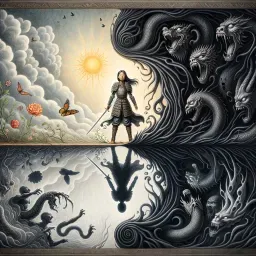To err is human, to forgive, divine

0
0
0
0
- Meaning
- This phrase is a profound commentary on human nature and the virtue of forgiveness. The first part, "To err is human," acknowledges that making mistakes is a natural part of being human. Everyone makes mistakes, and it's an essential part of learning and growing. The second part, "to forgive, divine," suggests that the act of forgiving those mistakes transcends ordinary human behavior and approaches a godly or divine nature. Forgiveness is seen as one of the highest virtues, highlighting compassion, empathy, and the capacity to let go of resentment.
- Allegory
- The serene and glowing figure symbolizes divine forgiveness, embodying compassion and mercy. The human form's expression of remorse represents the natural human tendency to make mistakes. The background split into chaotic and calm halves illustrates the turmoil caused by human errors and the peace that forgiveness can bring. The figure bridging these worlds highlights the transformative and healing power of forgiveness, reinforcing the phrase's message that while making mistakes is human, forgiving is a divine and profound virtue.
- Applicability
- This phrase can be applied in various aspects of personal life, especially in relationships. Whenever conflicts arise or mistakes are made, remembering that making errors is a natural part of the human experience can help reduce anger and frustration. The act of forgiving, inspired by the divine nature of mercy and compassion, can help mend relationships, foster understanding, and create a more harmonious environment.
- Impact
- This phrase has had a lasting impact on culture and literature. It is frequently cited in discussions about forgiveness and human fallibility. The expression has transcended literary circles and is often used in everyday conversations to promote empathy and understanding. The idea encapsulated in the phrase has inspired countless people to strive for higher moral ground in their actions and relationships.
- Historical Context
- The historical context of this phrase is the early 18th century. Alexander Pope wrote "An Essay on Criticism" in 1711, during the Enlightenment period, a time of intellectual and philosophical growth. This period emphasized reason, science, and exploration of human ethics and values. Pope's work reflects the era’s interest in understanding human nature and promoting moral virtues.
- Criticisms
- While the phrase is generally well-regarded, some criticisms might argue that it overly simplifies complex situations. Not all mistakes are easily forgivable, especially those involving deep harm or betrayal. Critics might point out that forgiveness can be challenging and even inappropriate in certain circumstances, suggesting the phrase could potentially downplay the gravity of some wrongdoings.
- Variations
- There are variations of this idea in different cultures. For instance, in many religions, forgiveness is viewed as a divine attribute and a pathway to spiritual purity. Interpretations might differ based on cultural values, but the core concept of recognizing human imperfection and valuing forgiveness remains consistent across many traditions.
-

You reap what you sow.
-

While there's life, there's hope.
-

Happiness is not something ready-made. It comes from your own actions.
-

Battle not with monsters, lest ye become a monster, and if you gaze into the abyss, the abyss gazes also into you.
-

A lie can travel halfway around the world while the truth is still putting on its shoes.
-

United we stand, divided we fall.
-

Judge not, that ye be not judged.
-

All the kings of the earth will bow down before him, and all nations will serve him.
-

Begin at the beginning.
-

Gather ye rosebuds while ye may.
-

Fools rush in where angels fear to tread.
No Comments